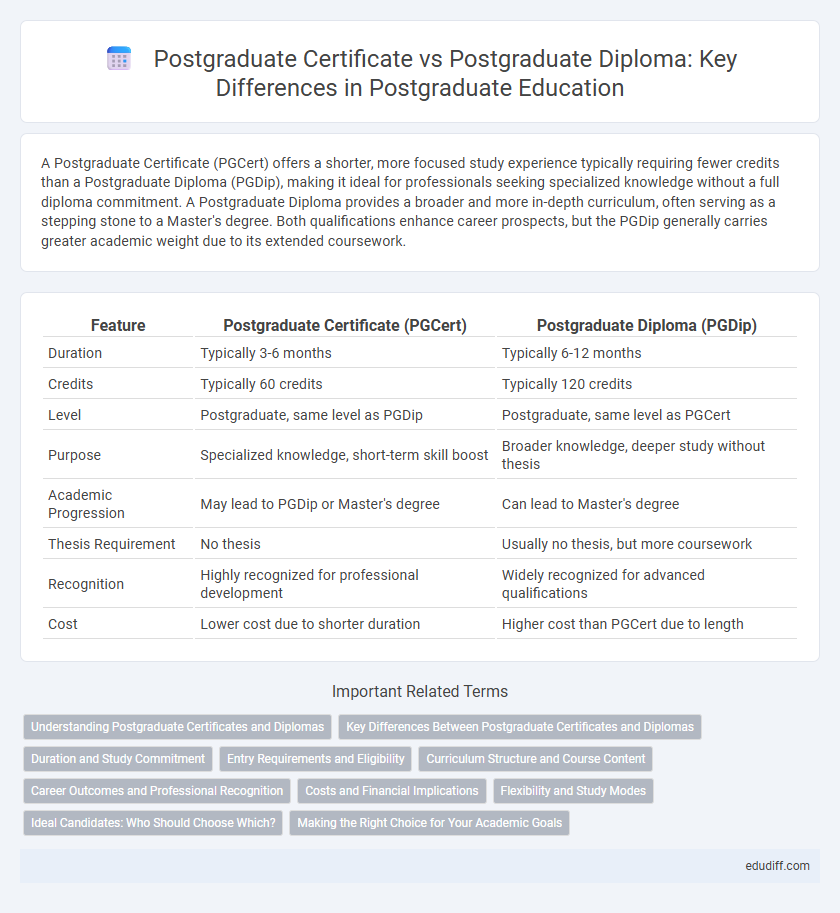A Postgraduate Certificate (PGCert) offers a shorter, more focused study experience typically requiring fewer credits than a Postgraduate Diploma (PGDip), making it ideal for professionals seeking specialized knowledge without a full diploma commitment. A Postgraduate Diploma provides a broader and more in-depth curriculum, often serving as a stepping stone to a Master's degree. Both qualifications enhance career prospects, but the PGDip generally carries greater academic weight due to its extended coursework.
Table of Comparison
| Feature | Postgraduate Certificate (PGCert) | Postgraduate Diploma (PGDip) |
|---|---|---|
| Duration | Typically 3-6 months | Typically 6-12 months |
| Credits | Typically 60 credits | Typically 120 credits |
| Level | Postgraduate, same level as PGDip | Postgraduate, same level as PGCert |
| Purpose | Specialized knowledge, short-term skill boost | Broader knowledge, deeper study without thesis |
| Academic Progression | May lead to PGDip or Master's degree | Can lead to Master's degree |
| Thesis Requirement | No thesis | Usually no thesis, but more coursework |
| Recognition | Highly recognized for professional development | Widely recognized for advanced qualifications |
| Cost | Lower cost due to shorter duration | Higher cost than PGCert due to length |
Understanding Postgraduate Certificates and Diplomas
Postgraduate Certificates typically require 60 credits and focus on specialized knowledge in a specific field, offering a shorter, more flexible study option. Postgraduate Diplomas generally demand 120 credits and provide more comprehensive subject mastery, often serving as a stepping stone toward a full master's degree. Both qualifications enhance professional skills and academic credentials but vary in depth and duration of study.
Key Differences Between Postgraduate Certificates and Diplomas
Postgraduate Certificates typically require fewer credits, usually around 30, and focus on specialized knowledge in a particular field within six months to one year, while Postgraduate Diplomas demand approximately 60 credits and offer a broader scope of study over one to two years. Certificates often serve as quick skill enhancers for professionals, whereas Diplomas provide more comprehensive academic training and can sometimes lead to a pathway for a master's degree. The depth of research and coursework intensity also distinguishes Diplomas, which generally involve more rigorous assessments than Certificates.
Duration and Study Commitment
A Postgraduate Certificate typically requires three to six months of part-time study, focusing on core modules with a lower total credit requirement, often around 60 credits. In contrast, a Postgraduate Diploma usually demands six to twelve months of study, involving a higher credit load of approximately 120 credits, reflecting a more comprehensive curriculum. This difference in duration and credit intensity directly impacts the level of study commitment and depth of academic engagement for postgraduate students.
Entry Requirements and Eligibility
Postgraduate Certificate programs typically require a bachelor's degree or equivalent qualification, with some courses accepting relevant professional experience in lieu of formal education. Postgraduate Diplomas often have similar entry criteria but may demand a higher academic standard, such as a minimum GPA or specific subject prerequisites related to the field of study. Eligibility for both varies by institution and course, emphasizing applicants' readiness for advanced study and relevant background knowledge.
Curriculum Structure and Course Content
Postgraduate Certificates typically include 3 to 4 modules focusing on core subjects, offering a concise curriculum designed for specialized knowledge in a shorter timeframe. Postgraduate Diplomas extend this structure by encompassing 6 to 8 modules, providing a broader and deeper exploration of the subject with additional elective options and practical components. The diploma curriculum often incorporates advanced theoretical concepts and applied skills, preparing students for professional practice or further academic study.
Career Outcomes and Professional Recognition
Postgraduate Diplomas typically offer more comprehensive coursework than Postgraduate Certificates, enhancing career outcomes by providing deeper specialization critical for professional advancement. Employers often recognize Postgraduate Diplomas as evidence of advanced expertise, which can lead to higher salary prospects and leadership roles. Postgraduate Certificates, while shorter, serve as valuable credentials for quick skill enhancement and may support entry-level positions or role shifts within industries.
Costs and Financial Implications
Postgraduate Certificates typically cost less than Postgraduate Diplomas due to their shorter duration and fewer credit requirements, making them a more affordable option for those seeking advanced qualifications without extensive financial commitment. Postgraduate Diplomas often require a higher tuition fee but provide deeper academic engagement and greater professional recognition, which can justify the additional investment. Financial implications also include potential funding availability, as scholarships and employer sponsorships may differ between certificate and diploma programs.
Flexibility and Study Modes
Postgraduate Certificates offer greater flexibility with shorter duration and part-time or online study modes, ideal for professionals seeking quick skill enhancement. Postgraduate Diplomas typically require longer commitment and offer a broader curriculum, available through full-time, part-time, and blended learning options. Both qualifications cater to diverse learning preferences, but Certificates emphasize convenience while Diplomas provide more comprehensive academic exposure.
Ideal Candidates: Who Should Choose Which?
Postgraduate Certificates are ideal for professionals seeking targeted skill enhancement or career change without committing to extensive study, offering a concise curriculum often completed within six months. Postgraduate Diplomas suit candidates aiming for comprehensive knowledge and academic depth in their field, typically requiring one year of study and acting as a pathway to a full Master's degree. Selecting the right qualification depends on career goals, time availability, and the level of specialization desired.
Making the Right Choice for Your Academic Goals
Choosing between a Postgraduate Certificate and a Postgraduate Diploma depends on your career objectives and time commitment, with certificates typically requiring less study and focusing on specific skills, while diplomas offer broader academic coverage. Postgraduate Diplomas often serve as a stepping stone toward a full Master's degree, providing a more comprehensive curriculum and deeper subject mastery. Assessing your professional goals, available time, and desired depth of knowledge ensures the best alignment with your academic pursuits.
Postgraduate Certificate vs Postgraduate Diploma Infographic

 edudiff.com
edudiff.com